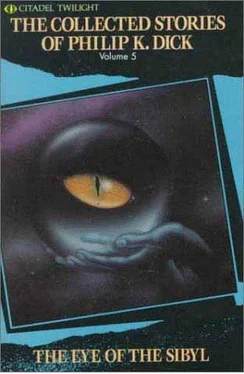As he twisted open the outer door the kitten within the box under his arm snarled.
You, too? Milt Biskle thought, and paused.
Death, the emptiness and utter lack of warmth of ‘tween space, seeped around him, filtering past the partly opened outer door. He smelled it and something within him, as in the kitten, retreated by instinct. He paused, holding the box, not trying to push the outer door any farther open, and in that moment the stewardess grabbed him.
“Mr. Biskle,” she said with a half-sob, “are you out of your mind? Good God, what are you doing?” She managed to tug the outer door shut, screw the emergency section back into shut position.
“You know exactly what I’m doing,” Milt Biskle said as he allowed her to propel him back into the ship and to his seat. And don’t think you stopped me, he said to himself. Because it wasn’t you. I could have gone ahead and done it. But I decided not to.
He wondered why.
Later, at Field Three on Mars, Dr. DeWinter met him as he had expected.
The two of them walked to the parked ‘copter and DeWinter in a worried tone of voice said, “I’ve just been informed that during the trip—”
“That’s right. I attempted suicide. But I changed my mind. Maybe you know why. You’re the psychologist, the authority as to what goes on inside us.” He entered the ‘copter, being careful not to bang the box containing the Terran kitten.
“You’re going to go ahead and stake your landparcel with Fay?” Dr. DeWinter asked presently as the ‘copter flew above green, wet fields of high protein wheat. “Even though—you know?”
“Yes.” He nodded. After all, there was nothing else for him, as far as he could make out.
“You Terrans.” DeWinter shook his head. “Admirable.” Now he noticed the box on Milt Biskle’s lap. “What’s that you have there? A creature from Terra?” He eyed it suspiciously; obviously to him it was a manifestation of an alien form of life. “A rather peculiar-looking organism.”
“It’s going to keep me company,” Milt Biskle said. “While I go on with my work, either building up my private parcel or—” Or helping you Proxmen with Terra, he thought.
“Is that what was called a ‘rattlesnake’? I detect the sound of its rattles.” Dr. DeWinter edged away.
“It’s purring.” Milt Biskle stroked the kitten as the autonomic circuit of the ‘copter guided it across the dully red Martian sky. Contact with the one familiar life-form, he realized, will keep me sane. It will make it possible for me to go on. He felt grateful. My race may have been defeated and destroyed, but not all Terran creatures have perished. When we reconstruct Terra maybe we can induce the authorities to allow us to set up game preserves. We’ll make that part of our task, he told himself, and again he patted the kitten. At least we can hope for that much.
Next to him, Dr. DeWinter was also deep in thought. He appreciated the intricate workmanship, by engineers stationed on the third planet, which had gone into the simulacrum resting in the box on Milt Biskle’s lap. The technical achievement was impressive, even to him, and he saw clearly—as Milt Biskle of course did not. This artifact, accepted by the Terran as an authentic organism from his familiar past, would provide a pivot by which the man would hang onto his psychic balance.
But what about the other reconstruct engineers? What would carry each of them through and past the moment of discovery as each completed his work and had to—whether he liked it or not—awake?
It would vary from Terran to Terran. A dog for one, a more elaborate simulacrum, possibly that of a nubile human female, for another. In any case each would be provided with an “exception” to the true state. One essential surviving entity, selected out of what had in fact totally vanished. Research into the past of each engineer would provide the clue, as it had in Biskle’s instance; the cat-simulacrum had been finished weeks before his abrupt, panic-stricken trip home to Terra. For instance, in Andre’s case a parrot-simulacrum was already under construction. It would be done by the time he made his trip home.
“I call him Thunder,” Milt Biskle explained.
“Good name,” Dr. DeWinter—as he titled himself these days—said. And thought, A shame we could not have shown him the real situation of Terra. Actually it’s quite interesting that he accepted what he saw, because on some level he must realize that nothing survives a war of the kind we conducted. Obviously he desperately wanted to believe that a remnant, even though no more than rubble, endures. But it’s typical of the Terran mind to fasten onto phantoms. That might help explain their defeat in the conflict; they were simply not realists.
“This cat,” Milt Biskle said, “is going to be a mighty hunter of Martian sneak-mice.”
“Right,” Dr. DeWinter agreed, and thought, As long as its batteries don’t run down. He, too, patted the kitten.
A switch closed and the kitten purred louder.
Peace Officer Caleb Myers picked up the fast-moving surface vehicle on his radarscope, saw at once that its operator had managed to remove the governor; the vehicle, at one-sixty miles per hour, had exceeded its legal capacity. Hence, he knew, the operator came from the Blue Class, engineers and technicians capable of tinkering with their wheels. Arrest, therefore, would be a tricky matter.
By radio Myers contacted a police vessel ten miles north along the freeway. “Shoot its power supply out as it passes you,” he suggested to his brother officer. “It’s going too fast to block, right?”
At 3:10 A.M. the vehicle was stopped; powerless, it had coasted to a halt on the freeway shoulder. Officer Myers pressed buttons, flew leisurely north until he spotted the helpless wheel, plus the red-lit police wheel making its way through heavy traffic toward it. He landed at the exact instant that his compatriot arrived on the scene.
Together, warily, they walked to the stalled wheel, gravel crunching under their boots.
In the wheel sat a slim man wearing a white shirt and tie; he stared straight ahead with a dazed expression, making no move to greet the two gray-clad officers with their laser rifles, anti-pellet bubbles protecting their bodies from thigh to cranium. Myers opened the door of the wheel and glanced in, while his fellow officer stood with rifle in hand, just in case this was another come-on; five men from the local office, San Francisco, had been killed this week alone.
“You know,” Myers said to the silent driver, “that it’s a mandatory two-year suspension of license if you tamper with your wheel’s speed governor. Was it worth it?”
After a pause the driver turned his head and said, “I’m sick.”
“Psychically? Or physically?” Myers touched the emergency button at his throat, making contact with line 3, to San Francisco General Hospital; he could have an ambulance here in five minutes, if necessary.
The driver said huskily, “Everything seemed unreal to me. I thought if I drove fast enough I could reach some place where it’s—solid.” He put his hand gropingly against the dashboard of his wheel, as if not really believing the heavily-padded surface was there.
“Let me look in your throat, sir,” Myers said, and shone his flashlight in the driver’s face. He turned the jaw upward, peered down past well-cared-for teeth as the man reflexively opened his mouth.
“See it?” his fellow officer asked.
“Yes.” He had caught the glint. The anti-carcinoma unit, installed in the throat; like most non-Terrans this man was cancer phobic. Probably he had spent most of his life in a colony world, breathing pure air, the artificial atmosphere installed by autonomic reconstruct equipment prior to human habitation. So the phobia was easy to understand.
Читать дальше









